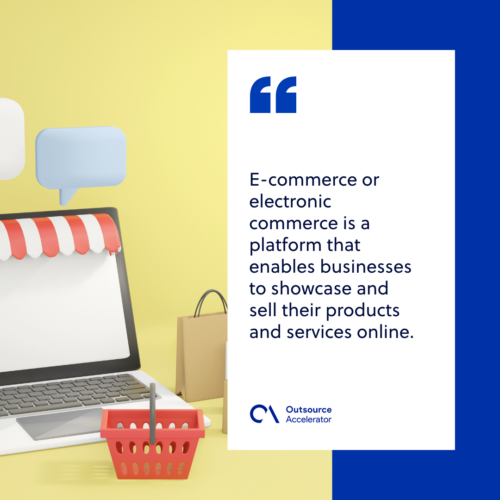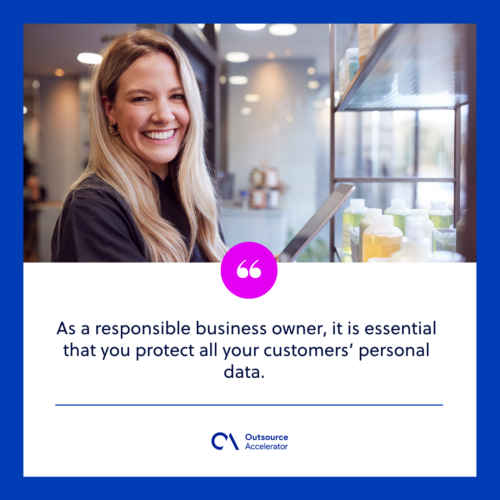6 key elements towards ecommerce success

Online purchases had been skyrocketing even before the global pandemic. Thanks to digital innovations, we can now easily make any transaction online.
Due to the tight competition, businesses have to look for ways to achieve e-commerce success.
As a business owner, your e-commerce serves as an alternative to your physical store. Thus, your e-commerce success will also depend on various factors and features.
In this article, we’ll discuss seven key elements you need to incorporate into your e-commerce business model. We’ve also shared three big brands’ business success stories and what lessons you can learn from their online ventures.
Defining e-commerce success
E-commerce or electronic commerce is a platform that enables businesses to showcase and sell their products and services online.
E-commerce sites can replace your brick-and-mortar stores. However, some business owners prefer to have both.
Every transaction performed on your e-commerce will require an exchange of funds and data digitally.
E-commerce can also be used for other purposes, such as ticketing and auctions online. More so, it can also be utilized for the following main models:
- Consumer-to-Consumer (C2C)
- Consumer-to-Business (C2B)
- Business-to-Consumer (B2C)
- Business-to-Business (B2B)
- Consumer-to-Administration (C2A)
- Business-to-Administration (B2A)
Many established brands today are thriving in the e-commerce industry, which allows them to save on operational costs while earning more revenue. Compared to having a physical store, e-commerce lets you reach a wider audience and demographic.
And, of course, people can shop on your online store anytime and anywhere through the internet.

3 e-commerce success stories you can learn from
There are a lot of famous e-commerce websites from people from all over the world who have been buying products or services. Among these online shopping stores are Amazon, eBay, and Sephora.
But just like any business venture, your e-commerce will also require hard work.
Here are three examples of well-known brands and their e-commerce success stories:
Beardbrand
There are many beard products available online today. However, what made Beardbrand stand out among other competitors was its branding.
This company used powerful content creation through storytelling to build a strong brand and consumer identity.
Through its “the urban beardsman,” BeardBrand successfully linked its customers’ real-life experiences to its brand. This content marketing tactic brought in over $120,000 each month during its first year.
Hello Matcha
Hello Matcha is a matcha green tea line owned by Shopify. Its product team was still able to pull through a successful launch, given its tight budget and little time frame.
The Hello Matcha green tea line was a result of deep research and consumer trends in the current market industry.
To stay competitive, the team focused on its content marketing strategies. Further, they also produced a premium matcha brand and product packaging that supported their marketing strategies.
Shopify’s product team was able to attract new customers and generate $900 within three days after the launch.
5.11 Tactical
5.11 Tactical was already successful by selling through various dealer networks. However, the company still aimed for a wider reach through its direct-to-consumer sales online.
5.11 Tactical was able to reach an annual revenue of $10 million through its search engine optimization. They were able to achieve this through a mix of email marketing campaigns and print marketing.
6 keys towards your e-commerce success
Your e-commerce should not only be about having great products. You should also be able to provide a progressive web application that consumers will love to come back to and shop over the internet.
Your e-commerce success will also depend on the following factors:
1. Mobile-friendliness
Nowadays, most online transactions are done through consumers’ smartphones or tablets. In the US alone, its overall e-commerce sales are expected to be $740 billion by the year 2023.
You need to focus on your customer journey by boosting their mobile experience each time they visit your e-commerce store.
A poor mobile experience will lead to customer loss, as customers will usually leave your site without browsing through what you offer.
2. Credibility
Your customers should be able to trust your e-commerce. During online transactions, your customers will be required to share sensitive information like their credit card, address, and phone number.
As a responsible business owner, it is essential that you protect all your customers’ personal data. Ensure that you have strong data protection and data privacy policies.

3. Easy navigation
You will most likely lose potential customers if they aren’t able to find what they are looking for on your website. Your customers should be able to find what they are looking for easily.
Start by having a clear menu bar with your products divided into different categories and subcategories.
4. Customer satisfaction
Your e-commerce website allows your business to operate for twenty-four hours. During that time, your customers will usually need support in terms of pre-sale and post-sale customer service.
Excellent customer service is crucial to your e-commerce success.
Partnering with an outsourcing firm like Peak Support allows you to provide 24/7 support to your customers, even during off-hours continuously.
Furthermore, customer reviews are one of the most authentic and effective ways to promote your brand. Remember that customers trust what other people think of your products and services.
5. Seamless check-out
Your customers should be able to have an easy and fast checkout experience. This will help you avoid customers who often end up abandoning their online shopping carts.
Some e-commerce may still prefer to have consumers register first before allowing checkout. However, you may also consider having a “guest checkout option” on your website.
Your e-commerce site should also provide an omnichannel customer experience.
Through this, you allow consumers to complete their purchases across different digital platforms without having them restart the entire process.
6. Customer engagement
Customer engagement directly influences customer loyalty, satisfaction, and conversion rates. Engaged customers are more likely to:
- Spend more time on the site
- Purchase more products or services
- Return for future transactions
Effective engagement strategies enhance the shopping experience, build trust, and foster long-term relationships. This not only boosts sales and revenue but also generates positive word-of-mouth, helping attract new customers and sustain business growth.
7. Influencer marketing
Influencer marketing can boost e-commerce success. Leverage the reach and credibility of influencers to promote products.
Influencers have loyal followers who trust their recommendations, which can drive higher engagement and conversion rates. This approach enhances brand visibility, builds trust, and can lead to increased sales.
Collaborations with influencers also allow brands to tap into new audiences and market segments, further expanding their customer base.







 Independent
Independent




